Programmed and Projected by Julian Antos, Becca Hall, Rebecca Lyon, Kyle Westphal, and Cameron Worden.
Our screenings are held at multiple venues around Chicago, including:
- The Auditorium at Northeastern Illinois University (Building E) – 3701 W. Bryn Mawr Ave., Chicago, IL 60625
Tickets: General Admission: $5 • NEIU Students: $2
- The Music Box Theatre – 3733 N. Southport Ave., Chicago, IL 60613
Tickets: General Admission: $7
Wednesday, May 3 @ 7:30 PM / NEIU
THUNDER ROAD
Directed by Arthur Ripley • 1958
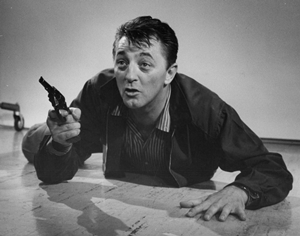 Following the release of his first LP, Calypso Is Like So ..., Robert Mitchum delivered an even more personal testament, Thunder Road, a no-frills hillbilly thriller rooted in the eternal struggle between the moonshiners and the revenue men. Though nominally directed by silent film survivor Arthur Ripley, Thunder Road is definitely Mitchum’s show: he concocted the story, produced the movie, wrote the Billboard-charting theme song “Ballad of Thunder Road,” starred as veteran distiller Lucas Doolin, and cast his son James Mitchum as Doolin’s kid brother. Shot on location in Asheville, North Carolina, it played near-continuously in that state for three decades. The filmmaking is basic as a bag of dirt, but that’s an essential part of Thunder Road’s effortlessly elemental power: it’s a backwoods Beowulf that lumbers as storytelling and stumbles when it gropes for poetry but remains unassailable, irreducible. Richard Thompson’s evocative appreciation in Kings of the Bs remains definitive: “As a work, it shrinks from art straight toward its own truth. It transcends the limits of art because it is uncompromised by any elevated artistic intent: it exists at the white-hot juncture of fact and legend …. The film exists for a postwar subculture built on adolescence, cars, roads, night, windows rolled down, sleeves rolled up, and Chuck Berry on the radio.” (KW)
Following the release of his first LP, Calypso Is Like So ..., Robert Mitchum delivered an even more personal testament, Thunder Road, a no-frills hillbilly thriller rooted in the eternal struggle between the moonshiners and the revenue men. Though nominally directed by silent film survivor Arthur Ripley, Thunder Road is definitely Mitchum’s show: he concocted the story, produced the movie, wrote the Billboard-charting theme song “Ballad of Thunder Road,” starred as veteran distiller Lucas Doolin, and cast his son James Mitchum as Doolin’s kid brother. Shot on location in Asheville, North Carolina, it played near-continuously in that state for three decades. The filmmaking is basic as a bag of dirt, but that’s an essential part of Thunder Road’s effortlessly elemental power: it’s a backwoods Beowulf that lumbers as storytelling and stumbles when it gropes for poetry but remains unassailable, irreducible. Richard Thompson’s evocative appreciation in Kings of the Bs remains definitive: “As a work, it shrinks from art straight toward its own truth. It transcends the limits of art because it is uncompromised by any elevated artistic intent: it exists at the white-hot juncture of fact and legend …. The film exists for a postwar subculture built on adolescence, cars, roads, night, windows rolled down, sleeves rolled up, and Chuck Berry on the radio.” (KW)
92 min • DRM Productions • 35mm from private collection, permission Park Circus
Short: “Meta-Four” (Wade Novy, 1964) – 16mm – 14 min
“Meta-Four” appears courtesy of Berkeley Art Museum and Pacific Film Archive
Tuesday, May 16 @ 7:30 PM / NEIU
LINDA
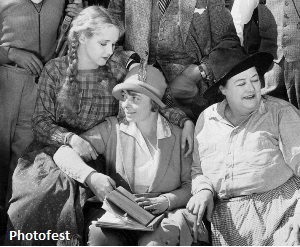 Directed by Dorothy Davenport • 1929
Directed by Dorothy Davenport • 1929
With live organ accompaniment from Jay Warren!
When her husband Wallace Reid, “the world’s most perfect lover,” died in a sanitarium from complications related to his morphine addiction, actress Dorothy Davenport began producing what were essentially exploitation films, beginning with the now-lost 1923 anti drug feature Human Wreckage, the first in a planned “Sins of the World” series co-produced by Thomas Ince. Linda, her last silent picture and second for her independent production company, is more of a straightforward melodrama, but Davenport’s roots as a low-budget filmmaker make it all the more immediate and effective—it’s Human Wreckage without the drugs. Helen Foster is forced to marry an old lumber dealer (Noah Beery) by her evil father. Beery isn’t such a bad guy, it turns out, but Foster eventually flees to the city and falls in love with kindly doctor Warner Baxter. Originally distributed through a decentralized “states rights” system that almost guaranteed Linda would be left unscreened in the decades to come, Davenport’s film has been newly preserved by the Library of Congress. You’d be forgiven for not being familiar with this one, especially since the only post-1929 reviews so far are tweets from last year’s Capitolfest in Rome, New York. We trust @NitrateDiva, who calls Linda “a lyrical, outstanding melodrama ripe for rediscovery!” (JA)
75 min • Mrs. Wallace Reid Productions • 35mm from the Library of Congress
Short: Laurel and Hardy in “The Finishing Touch” (Clyde Bruckman, Leo McCarey, 1928) – 35mm from Library of Congress – 19 min
Monday, May 22 @ 7:15 PM / Music Box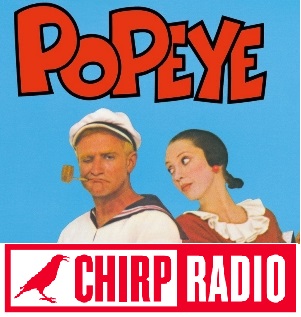
POPEYE
Directed by Robert Altman • 1980
Robin Williams and Shelley Duvall are Popeye and Olive Oyl in this unlikely and sublime live-action adaptation of the timeless Fleischer Studios cartoons. Paramount went all out on their 1980 mega-production, which involved building an entire village in Malta (“Popeye Village” still exists as a tourist attraction), though domestic grosses fell significantly short of expectations. Producer Robert Evans hoped to tame the barbarous Robert Altman as he had Roman Polanski (Chinatown) and Francis Ford Coppola (The Godfather), but this was not the right film. Long overlooked in favor of more “serious” Altman pictures, Popeye, writes Scott Tobias, “is like a family-friendly re-imagining of McCabe & Mrs. Miller, moving the same mud-caked, dilapidated town from the Pacific Northwest to the Mediterranean seas without losing the anti-capitalist sentiment in the process.” The result is both heartfelt and manic, and exceedingly faithful to the original work. Why can’t all comic book movies be this great? With music by Harry Nilsson and Van Dyke Parks (later used to great effect in Paul Thomas Anderson’s Punch Drunk Love). Screening in a one-of-a-kind 35mm print from the Robert Altman Collection at the UCLA Film and Television Archive. (JA)
114 min • Paramount Pictures • 35mm from UCLA, Permission Paramount
Cartoon: Popeye the Sailor in “Goonland” (Dave Fleischer, 1938) – 16mm – 8 min
Co-sponsored by CHIRP – Chicago Independent Radio Project
Tuesday, May 30 @ 7:30 PM / NEIU
THE RIVER
Directed by Tsai Ming-liang • 1997
In Mandarin with English subtitles
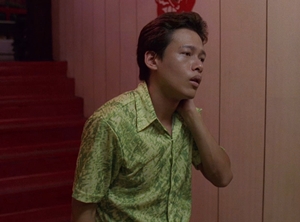 By the late ’90s, director Tsai Ming-liang had established himself as one of the leading lights in Taiwanese filmmaking, a favorite with critics and adventurous film festival programmers alike. The River was the last film Tsai would make that would hew towards narrative convention while also embracing the radical slowness that would become a stylistic signature for him. While hanging around a movie set with a female acquaintance, Lee Hsiao-Kang (played by Tsai’s persistent leading actor and closest collaborator Lee Kang-sheng) is cast to play a dead body floating in the polluted Tamsui River. Almost immediately after the shoot is over, he begins to develop a mysterious illness, causing him physical pain and a great deal of emotional distress. Meanwhile, both his mother and father carry on affairs with men in between taking Hsiao-Kang to various medical specialists and spiritual healers. As with all of Tsai’s films, there are moments of strange, Keaton-inflected, nonverbal deadpan humor as well as a surfeit of water imagery and free-floating, quietly tumultuous, queer desire. Featuring an emotionally decimating ending stretch unparalleled in Tsai’s filmography (or most of cinema for that matter), The River earns its reputation as one of the greatest films of the ’90s. (CW)
By the late ’90s, director Tsai Ming-liang had established himself as one of the leading lights in Taiwanese filmmaking, a favorite with critics and adventurous film festival programmers alike. The River was the last film Tsai would make that would hew towards narrative convention while also embracing the radical slowness that would become a stylistic signature for him. While hanging around a movie set with a female acquaintance, Lee Hsiao-Kang (played by Tsai’s persistent leading actor and closest collaborator Lee Kang-sheng) is cast to play a dead body floating in the polluted Tamsui River. Almost immediately after the shoot is over, he begins to develop a mysterious illness, causing him physical pain and a great deal of emotional distress. Meanwhile, both his mother and father carry on affairs with men in between taking Hsiao-Kang to various medical specialists and spiritual healers. As with all of Tsai’s films, there are moments of strange, Keaton-inflected, nonverbal deadpan humor as well as a surfeit of water imagery and free-floating, quietly tumultuous, queer desire. Featuring an emotionally decimating ending stretch unparalleled in Tsai’s filmography (or most of cinema for that matter), The River earns its reputation as one of the greatest films of the ’90s. (CW)
115 min • Taiwan Central Motion Pictures Corporation • 35mm from Leisure Time Features
Short: “sound of a million insects, light of a thousand stars” (Tomonari Nishikawa, 2014) – 35mm – 2 min
Monday, June 12 @ 7:00 PM / Music Box
PALE FLOWER
Directed by Masahiro Shinoda • 1964
In Japanese with English subtitles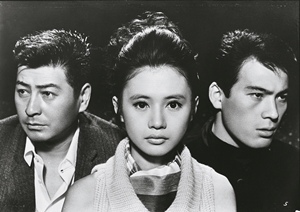
Masahiro Shinoda was only a few years into a remarkable five-decade directing career when he made Pale Flower, his most popular and enduring work and the yakuza film by which all others in the genre would be measured. Muraki (played by Ryo Ikebe, some years past his gentler turn in Ozu’s Early Spring) has recently been released from a three-year prison stint (for murder, naturally) and cannot help but throw himself, with studied indifference, into the scrum of Yokohama night-life. Meanwhile, the reckless and inscrutable Saeko (Mariko Kaga, giving Pale Flower‘s scariest and most internalized performance amidst her co-stars’ macho smoldering) has taken to haunting yakuza-overseen gambling dens, a notable and disruptive feminine presence in a stiflingly masculine underworld. Immediately drawn to one another, Muraki mentors Saeko in tehonbiki, their game of choice, as she attempts to stave off corrosive and self-destructive boredom and he attempts to keep his homicidal impulses at bay. A master class in widescreen composition from cinematographer Masao Kosugi with a score by legendary avant-garde composer Toru Takemitsu, Pale Flower matches its pitch black amour fou narrative with hard-as-nails stylistic pyrotechnics and lurid Baudelairean cinematic poetry. (CW)
96 min • Shochiku • 35mm from Janus Films
Cartoon: “Dance Squared” (Danse carrée) (René Jodoin, 1961) – 16mm – 4 min
Wednesday, June 14 @ 7:30 PM / NEIU
CLUNY BROWN
Directed by Ernst Lubitsch • 1946
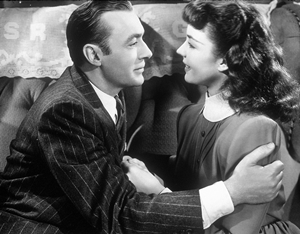 Lubitsch’s last completed film is everything one would hope for from one of Hollywood’s (and the Chicago Film Society’s) most beloved directors. Set in England on the verge of WWII, it’s a pithy commentary on class, with much of the film spent poking fun at the fumbling of British aristocrats and impotent liberals (“I’ve written a letter to the Times!” is one character’s earnest response to Hitler), while simultaneously managing to remain a weirdo romance. Destined to cross paths, two kindred misfits—Adam Belinski (Charles Boyer), a Czech intellectual hiding out from the Nazis (albeit leisurely), and Cluny Brown (Jennifer Jones), a bright plumber’s niece—both end up at the country estate of the wealthy Carmel family, Belinski as a guest and Cluny as a parlor maid. Belinski manages to charm his hosts with his knowledge of Shakespeare and purposeful ignorance of societal rules, while Cluny chips the china and goes on some soul-crushing dates with local pharmacist Jonathan W. Wilson (played beautifully by Richard Haydn). We pray Cluny isn’t lulled into the pharmacy life by Wilson’s mind-melting harmonium playing; just listen closely to the way Belinski says “Cluny” compared to Wilson’s clenched “Miiizzz Brown” and your ears will confirm where true love lies. It’s a film for anyone who’s ever been put in their place, ever felt out of place, or ever found their place in the arms of another. A strong supporting cast includes Una O’Connor, who literally snores her way through the film, and Helen Walker (Nightmare Alley) as a brassy society lady with all the best comebacks. (RL)
Lubitsch’s last completed film is everything one would hope for from one of Hollywood’s (and the Chicago Film Society’s) most beloved directors. Set in England on the verge of WWII, it’s a pithy commentary on class, with much of the film spent poking fun at the fumbling of British aristocrats and impotent liberals (“I’ve written a letter to the Times!” is one character’s earnest response to Hitler), while simultaneously managing to remain a weirdo romance. Destined to cross paths, two kindred misfits—Adam Belinski (Charles Boyer), a Czech intellectual hiding out from the Nazis (albeit leisurely), and Cluny Brown (Jennifer Jones), a bright plumber’s niece—both end up at the country estate of the wealthy Carmel family, Belinski as a guest and Cluny as a parlor maid. Belinski manages to charm his hosts with his knowledge of Shakespeare and purposeful ignorance of societal rules, while Cluny chips the china and goes on some soul-crushing dates with local pharmacist Jonathan W. Wilson (played beautifully by Richard Haydn). We pray Cluny isn’t lulled into the pharmacy life by Wilson’s mind-melting harmonium playing; just listen closely to the way Belinski says “Cluny” compared to Wilson’s clenched “Miiizzz Brown” and your ears will confirm where true love lies. It’s a film for anyone who’s ever been put in their place, ever felt out of place, or ever found their place in the arms of another. A strong supporting cast includes Una O’Connor, who literally snores her way through the film, and Helen Walker (Nightmare Alley) as a brassy society lady with all the best comebacks. (RL)
100 min • 20th Century-Fox • 35mm from Criterion Pictures, USA
Film Stock: Kodak B+W (2010) Lab: Cinetech
Cartoon: Popeye the Sailor in “Plumbing is a ‘Pipe'” (Dave Fleischer, 1938) – 16mm – 8 min
Wednesday, June 21 @ 7:30 PM / NEIU
WORKING GIRLS
Directed by Dorothy Arzner • 1931
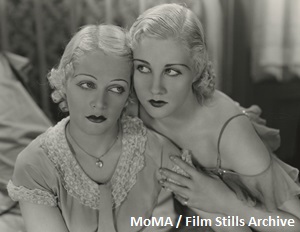 Two sisters, Mae and June Thorpe (Dorothy Hall and Judith Wood), move from Rockville, Indiana, to New York City seeking their fortune. Under the direction of Dorothy Arzner, this boilerplate premise becomes a nuanced examination of the intersection of class and gender in Depression-era urban America. The relationship between sexual mores, work, and social advancement is a central area of interest: the sisters’ professional positions are opportunities for both economic empowerment and romantic liaisons, the latter of which in turn can be a source of either upward mobility or social ruin. As the first female member of the Director’s Guild and the only woman director to sustain a Hollywood career into the 1940s, Arzner brought a focus on female relationships to her work that was rare among her studio contemporaries. The relationship between Mae and June is as important as the sisters’ romantic relationships, contrasting the literal bond of sisterhood and the support it provides with the often cruel and fickle world of men. Aside from her underground feminist film studies classic Dance, Girl, Dance, much of Arzner’s output remains unseen and unavailable outside of archives and studio vaults. (JR)
Two sisters, Mae and June Thorpe (Dorothy Hall and Judith Wood), move from Rockville, Indiana, to New York City seeking their fortune. Under the direction of Dorothy Arzner, this boilerplate premise becomes a nuanced examination of the intersection of class and gender in Depression-era urban America. The relationship between sexual mores, work, and social advancement is a central area of interest: the sisters’ professional positions are opportunities for both economic empowerment and romantic liaisons, the latter of which in turn can be a source of either upward mobility or social ruin. As the first female member of the Director’s Guild and the only woman director to sustain a Hollywood career into the 1940s, Arzner brought a focus on female relationships to her work that was rare among her studio contemporaries. The relationship between Mae and June is as important as the sisters’ romantic relationships, contrasting the literal bond of sisterhood and the support it provides with the often cruel and fickle world of men. Aside from her underground feminist film studies classic Dance, Girl, Dance, much of Arzner’s output remains unseen and unavailable outside of archives and studio vaults. (JR)
77 min • Paramount Pictures • 35mm from Universal
Short: Thelma Todd and Zasu Pitts in “The Pajama Party” (Hal Roach, 1931) – 16mm – 20 min
Tuesday, June 27 @ 7:30 PM / NEIU
CAR WASH
Directed by Michael Schultz • 1976
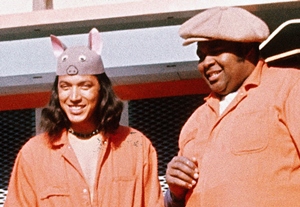 Anybody who has languished in a low-paying service industry job will recognize the spectrum of frustrations—from vomiting children and condescending customers to unreliable coworkers and the parade of shady personalities moving to and from the restroom—suffered with good humor and great spirit by the employees of the Dee Luxe Car Wash. Director Michael Schultz’s follow-up to CFS favorite Cooley High contains the unique mixture of comic hijinks and astute social observation that had been something of a signature for the filmmaker up to that point. Tracking a single day in and around the car wash, Schultz mostly dispenses with the notion of dramatic escalation here in favor of observing workaday life and luxuriating in the charisma of his sprawling, diverse cast. Richard Pryor and George Carlin’s cameos may have been the marquee attractions, but it’s the countless lesser-known workhorse performers who make lasting impressions, particularly Ivan Dixon as ex-con family man Lonnie, Bill Duke as militant revolutionary Abdullah, and Antonio Fargas as gender-fluid cosmetology student Lindy. Featuring one of the most enduring soundtracks of any era, an ever-present and insistent counterpoint to all of the film’s action, Car Wash bursts with immeasurable musical energy. Earning minimum wage has never been done with such style. (CW)
Anybody who has languished in a low-paying service industry job will recognize the spectrum of frustrations—from vomiting children and condescending customers to unreliable coworkers and the parade of shady personalities moving to and from the restroom—suffered with good humor and great spirit by the employees of the Dee Luxe Car Wash. Director Michael Schultz’s follow-up to CFS favorite Cooley High contains the unique mixture of comic hijinks and astute social observation that had been something of a signature for the filmmaker up to that point. Tracking a single day in and around the car wash, Schultz mostly dispenses with the notion of dramatic escalation here in favor of observing workaday life and luxuriating in the charisma of his sprawling, diverse cast. Richard Pryor and George Carlin’s cameos may have been the marquee attractions, but it’s the countless lesser-known workhorse performers who make lasting impressions, particularly Ivan Dixon as ex-con family man Lonnie, Bill Duke as militant revolutionary Abdullah, and Antonio Fargas as gender-fluid cosmetology student Lindy. Featuring one of the most enduring soundtracks of any era, an ever-present and insistent counterpoint to all of the film’s action, Car Wash bursts with immeasurable musical energy. Earning minimum wage has never been done with such style. (CW)
97 min • Universal • 35mm from Universal
Film Stock: Kodak 2383 (2002)
Short: Production Featurette for Greased Lightning (Michael Schultz, 1977) – 16mm – 6 min
Wednesday, July 5 @ 7:30 PM / NEIU
ANNE OF THE INDIES
Directed by Jacques Tourneur • 1951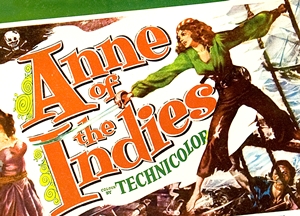
“Captain Providence isn’t a man—he’s a woman!” Jean Peters stars as Captain Providence, a 17th century lady pirate who slaps the face of any sea dog with the impudence to call her “mademoiselle.” A disciple of Blackbeard (Thomas Gomez) and fearless captain of the marauding Sheba Queen, Anne Providence is essentially a proto-capitalist who has no time for love if it gets in the way of business. Her priorities change when the Sheba Queen intercepts a British freighter with a handsome but shifty French prisoner (Louis Jourdan) aboard—a fateful decision that may threaten her nautical supremacy. Anne of the Indies foregrounds the novelty of a female pirate, but never succumbs to the rituals of humiliation and pacification so often visited upon successful career women in Hollywood films of the 1940s and ’50s. Much of the credit goes to Peters for her spunky performance and to genre man of all trades Jacques Tourneur, who delivers a Technicolor swashbuckler bathed in scorching primaries. Anne of the Indies also boasts one of Herbert Marshall’s most affecting and melancholic late-career performances as Anne’s doctor and confidante. (KW)
82 min • 20th-Century Fox • 35mm from Fox Library Services
Film Stock: Kodak 2383 (2010) Lab: Fotokem
Cartoon: “Popeye the Sailor Meets Sindbad the Sailor” (Dave Fleischer, 1936) – 16mm – 16 min
Sunday, July 9 @ 8:00 PM / Music Box
SHORT CUTS
Directed by Robert Altman • 1993
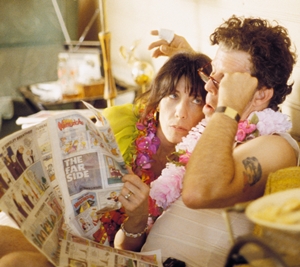 Adapting nine stories and a poem from Raymond Carver and transposing the action from the Pacific Northwest to the sprawling working class Los Angeles suburbs inhabited by chauffeurs, birthday clowns, motorcycle cops, waitresses, pool cleaners, phone sex operators, and assorted ne’er-do-wells, Robert Altman crafts a one-of-a-kind, eccentric epic which he alone could pull off. A long-gestating project that became one of several commercially dubious Altman ideas financed in the giddy aftermath of the Cannes premiere of The Player, Short Cuts finds the director returning to the intersecting tableau style of Nashville and A Wedding, this time with twenty-two major characters, including spectacular turns by Lily Tomlin, Tom Waits, Jack Lemmon, Andie MacDowell, Lyle Lovett, Julianne Moore, and Frances McDormand. A work of astonishing sociological and geographical density, Short Cuts perfectly captures the free-floating fin de siècle anxieties coursing down the 405 freeway and over the KCAL-9 airwaves—the Big One is coming. Although Altman had been experimenting with multi-track recording since the 1970s, Short Cuts was the first and only one of his films to be granted a 70mm release with six-channel Dolby Stereo. Released a few months after Jurassic Park introduced DTS digital sound to multiplexes across America and seemingly rendered hulking magnetic prints obsolete, Short Cuts was among the last studio features distributed in a 35mm-to-70mm blowup … at least until Inherent Vice brought the tradition back. (Short Cuts was shot in Super35, so don’t expect pictorial miracles, but blowup prints generally had sharper and steadier laboratory work than the general run of 35mm release prints in the early 1990s.) As an art house movie replete with full-frontal nudity and bad vibes, Short Cuts is the most unlikely candidate for 70mm blowup this side of Three Men and a Baby. (KW)
Adapting nine stories and a poem from Raymond Carver and transposing the action from the Pacific Northwest to the sprawling working class Los Angeles suburbs inhabited by chauffeurs, birthday clowns, motorcycle cops, waitresses, pool cleaners, phone sex operators, and assorted ne’er-do-wells, Robert Altman crafts a one-of-a-kind, eccentric epic which he alone could pull off. A long-gestating project that became one of several commercially dubious Altman ideas financed in the giddy aftermath of the Cannes premiere of The Player, Short Cuts finds the director returning to the intersecting tableau style of Nashville and A Wedding, this time with twenty-two major characters, including spectacular turns by Lily Tomlin, Tom Waits, Jack Lemmon, Andie MacDowell, Lyle Lovett, Julianne Moore, and Frances McDormand. A work of astonishing sociological and geographical density, Short Cuts perfectly captures the free-floating fin de siècle anxieties coursing down the 405 freeway and over the KCAL-9 airwaves—the Big One is coming. Although Altman had been experimenting with multi-track recording since the 1970s, Short Cuts was the first and only one of his films to be granted a 70mm release with six-channel Dolby Stereo. Released a few months after Jurassic Park introduced DTS digital sound to multiplexes across America and seemingly rendered hulking magnetic prints obsolete, Short Cuts was among the last studio features distributed in a 35mm-to-70mm blowup … at least until Inherent Vice brought the tradition back. (Short Cuts was shot in Super35, so don’t expect pictorial miracles, but blowup prints generally had sharper and steadier laboratory work than the general run of 35mm release prints in the early 1990s.) As an art house movie replete with full-frontal nudity and bad vibes, Short Cuts is the most unlikely candidate for 70mm blowup this side of Three Men and a Baby. (KW)
188 min • Fine Line Features • 70mm from Chicago Film Society Collections, Permission WB
Film Stock: Eastman LPP (1993) Lab: Technicolor
Preceded by a 70mm Blowup Trailer Reel
Regular Music Box Admission Prices Apply for this Show.
Wednesday, July 12 @ 7:30 PM / NEIU
IT HAPPENED HERE
Directed by Kevin Brownlow & Andrew Mollo • 1964
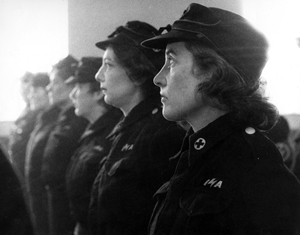 What if the Nazis had invaded Britain after the retreat from Dunkirk? As an opening title establishes, this is the world of It Happened Here: Britain, 1944, occupied by the Nazis. As U.S.-backed partisans attempt to take England back from fascist control, nurse Pauline Murray is evacuated from her village to the demilitarized city of London. Director Kevin Brownlow started the project as a teenager with help from friend, fellow teenager, and history buff Andrew Mollo. Over an eight-year production schedule, the two managed to complete It Happened Here on a microscopic budget without recourse to stock footage, finishing the film with raw stock donated by Stanley Kubrick from the production of Dr. Strangelove. The high-contrast photography is a perfect match for British newsreels of the period, as would be expected for any effort from future film scholar and preservationist Brownlow (The Parade’s Gone By), but everything here is a skillful recreation utilizing legions of amateur volunteer actors, including real British anti-Semites. Even leading lady Pauline Murray was an amateur actress, essentially playing herself after working as a nurse during World War II. The guilelessness Murray brings to the role keeps the film’s ethics from being black-and-white: as Pauline seeks normalcy amidst violence, no choice is as morally straightforward as the government of her world (or ours) might like us to believe. The film’s polemical vision of a Fascist “new normal” feels particularly relevant given the resurgence of far-right ideologies in the U.S. and Europe. (JR)
What if the Nazis had invaded Britain after the retreat from Dunkirk? As an opening title establishes, this is the world of It Happened Here: Britain, 1944, occupied by the Nazis. As U.S.-backed partisans attempt to take England back from fascist control, nurse Pauline Murray is evacuated from her village to the demilitarized city of London. Director Kevin Brownlow started the project as a teenager with help from friend, fellow teenager, and history buff Andrew Mollo. Over an eight-year production schedule, the two managed to complete It Happened Here on a microscopic budget without recourse to stock footage, finishing the film with raw stock donated by Stanley Kubrick from the production of Dr. Strangelove. The high-contrast photography is a perfect match for British newsreels of the period, as would be expected for any effort from future film scholar and preservationist Brownlow (The Parade’s Gone By), but everything here is a skillful recreation utilizing legions of amateur volunteer actors, including real British anti-Semites. Even leading lady Pauline Murray was an amateur actress, essentially playing herself after working as a nurse during World War II. The guilelessness Murray brings to the role keeps the film’s ethics from being black-and-white: as Pauline seeks normalcy amidst violence, no choice is as morally straightforward as the government of her world (or ours) might like us to believe. The film’s polemical vision of a Fascist “new normal” feels particularly relevant given the resurgence of far-right ideologies in the U.S. and Europe. (JR)
96 min • Rath Films • 35mm from Milestone Films
Film Stock: Eastman B+W (1996)
Short: Selected Cartoon
Wednesday, July 19 @ 7:30 PM / NEIU
GIRLFRIENDS
Directed by Claudia Weill • 1978
After being dumped by her roommate (Anita Skinner) at the corner laundromat, Susan Weinblatt (Melanie Mayron) sets out to chart a new life for herself as a twentysomething single New Yorker who can paint her apartment any damn color she wants now. An aspiring photographer whose eye for the female body finds only fitful expression in bar mitzvah and wedding gigs, Susan struggles to keep the electricity on, but ultimately values her solitude over material comfort. She ascertains that most men her age are just interested in football or John Ford movies, but the women aren’t much better: Ceil (Amy Wright), the hitchhiker who becomes her involuntary roommate, can’t keep her hands away from Susan’s closet—or her body. Then again, neither can Susan’s rabbi, played with disarming sweetness by Eli Wallach (!). Shot cheaply on 16mm and pieced together over a year with the support of the AFI, the NEA, and New York State Council on the Arts, the feature debut of producer-director Claudia Weill is a landmark of low-key, unprepossessing feminism, sexual frankness, and Upper West Side Jewish ethnography. A key antecedent of Greta Gerwig and Noah Baumbach’s Frances Ha and Lena Dunham’s Girls, Girlfriends is the tender human comedy you never knew you’d been missing. (KW)
88 min • Cyclops Productions • 35mm from Warner Bros.
Film Stock: Eastman LPP (1989)
Short: “Joyce at 34” (Joyce Chopra and Claudia Weill, 1973) – 16mm – 28 min
“Joyce at 34” courtesy of the Reserve Film and Video Collection of The New York Public Library for the Performing Arts. “Joyce at 34” has been preserved with funding from the National Film Preservation Foundation.
Wednesday, July 26 @ 7:30 PM / NEIU
THE MATCH KING
Directed by Howard Bretherton and William Keighley • 1932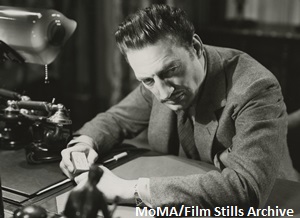
Warner Bros.-First National made its share of risqué and radical films during the pre-Production Code era, but none is so crammed with topical incident as The Match King. Based on the life of Ivar Kreuger, the Swedish con artist who popularized the superstition that “three on a match” brought bad luck (and boosted sales volume accordingly), The Match King chronicles Warren William’s rise from lowly Chicago Cubs sanitation worker to continental matchstick magnate. (Talk about efficiency: Kreuger killed himself in March 1932, and his life story reached the screen before year’s end.) A man capable of bluffing from the heart, leveraging assets out of thin air, and outright stealing whatever he needs to stay one step ahead of his creditors and competitors, William’s Paul Kroll is a tycoon only Ayn Rand could love. (Indeed, Rand brought her own version of Kreuger’s death to the stage as Night of January 16th, which naturally presented the so-called criminal as a victim of a mediocre, conformist society.) Like the best pre-Code films, The Match King subsists on a simple moral imperative, but ultimately stands apart from its brethren on the basis of its globe-trotting scope, ruthless forward momentum, and ever-timely warning against trusting a dealmaker in sheep’s clothing. (KW)
78 min • First National Pictures • 35mm from Library of Congress, permission Swank
Film Stock: Kodak 2302 (2009) Lab: Library of Congress
Cartoon: Bugs Bunny and Yosemite Sam in “Buccaneer Bunny” (Friz Freleng, 1948) – 16mm – 8 min
Wednesday, August 2 @ 7:30 PM / NEIU
MELVIN AND HOWARD
Directed by Jonathan Demme • 1980
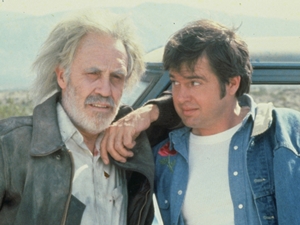 Milkman, aspiring country-western singer, and perennial loser Melvin Dummar is the unlikeliest personage ever to see his life turned into a movie but Jonathan Demme’s Melvin and Howard isn’t a particularly likely film to begin with: a dusty and sun-blasted, meandering and downbeat comedy defined as much by its low stakes as by its irrepressibly sweet and egalitarian worldview, arriving as ambivalence and anti-heroics were going out of fashion with the crumbling New Hollywood. In a life chock-full of colorful anecdotes, the time Dummar (played by a perpetually flummoxed Paul Le Mat) gave a ride to a hitchhiking Howard Hughes (an appealingly sour Jason Robards)—an event that would bring him into the public eye when a will naming him the recipient of 156 million dollars from the Hughes estate would surface a decade later—is perhaps the most extraordinary and least believable. While Dummar came to be widely defined by the incident and ensuing legal battle, Melvin and Howard spends relatively little time on Hughes, relegating him mostly to the film’s first reel. Instead, Melvin and Howard chooses to focus on Melvin’s repeated marriages to and divorces from his wife Lynda (Mary Steenburgen, who won an Academy Award for her performance), his struggles to win and maintain the title of “Milkman of the Month,” and the persistent money troubles that hound him and his family. Demme does the best work of his career here, vividly rendering Melvin and Howard‘s world of polyester, formica, and bologna sandwiches with inestimable love and respect. (CW)
Milkman, aspiring country-western singer, and perennial loser Melvin Dummar is the unlikeliest personage ever to see his life turned into a movie but Jonathan Demme’s Melvin and Howard isn’t a particularly likely film to begin with: a dusty and sun-blasted, meandering and downbeat comedy defined as much by its low stakes as by its irrepressibly sweet and egalitarian worldview, arriving as ambivalence and anti-heroics were going out of fashion with the crumbling New Hollywood. In a life chock-full of colorful anecdotes, the time Dummar (played by a perpetually flummoxed Paul Le Mat) gave a ride to a hitchhiking Howard Hughes (an appealingly sour Jason Robards)—an event that would bring him into the public eye when a will naming him the recipient of 156 million dollars from the Hughes estate would surface a decade later—is perhaps the most extraordinary and least believable. While Dummar came to be widely defined by the incident and ensuing legal battle, Melvin and Howard spends relatively little time on Hughes, relegating him mostly to the film’s first reel. Instead, Melvin and Howard chooses to focus on Melvin’s repeated marriages to and divorces from his wife Lynda (Mary Steenburgen, who won an Academy Award for her performance), his struggles to win and maintain the title of “Milkman of the Month,” and the persistent money troubles that hound him and his family. Demme does the best work of his career here, vividly rendering Melvin and Howard‘s world of polyester, formica, and bologna sandwiches with inestimable love and respect. (CW)
95 min • Universal • 35mm from Universal
Film Stock: Eastman SP (1980)
Short: The Three Stooges in “Busy Buddies” (Del Lord, 1944) – 35mm – 17 min
Tuesday, August 8 @ 7:30 PM / NEIU
THE OLD FASHIONED WAY
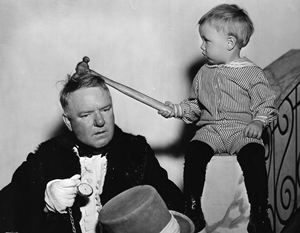 Directed by William Beaudine • 1934
Directed by William Beaudine • 1934
Swept into the town of Bellefontaine amidst a wave of debt notices and middling press, The Great McGonigle (W. C. Fields) and his theatrical troupe brave hostile authorities and the affections of wealthy patron and aspiring singer Cleopatra Pepperday (Jan Duggan) as they prepare for an imminent sold-out show. One of William Claude Dukenfield’s most indelible creations, The Great McGonigle is the type of charming, work-averse huckster Fields was born to play, a snake oil salesman with the soul of an artist. Taking up the back half of the film, the group’s production of The Drunkard; or, The Fallen Saved (an actual temperance play that was a staple of a good many 19th-century repertory theater companies like the one in The Old Fashioned Way) is a straight-faced send-up of the original play’s creaky and prudish morality that utilizes much of its actual text, predicting Alain Resnais’s late-career theatrical adaptations and demonstrating that there are limits to the nostalgia that an old standard can stir. It also climaxes with a tremendous demonstration of the Great Man’s juggling abilities, impressive by any means but especially coming from one so swollen with drink. Godfrey Daniel! (CW)
71 min • Paramount Pictures • 35mm from Universal
Film Stock: Kodak (2005) Lab: Triage
Short: Fox Movietone News (1934) – 35mm – 8 min
Wednesday, August 16 @ 7:30 PM / NEIU
LITTLE MURDERS
Directed by Alan Arkin • 1971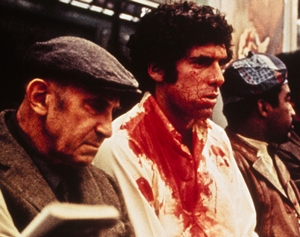
It’s 1970s New York City, a world of blackouts and senseless violence where every phone call is just another heavy breather. Slump-shouldered, self-proclaimed “apathist” Alfred (Elliott Gould) meets his match in Patsy (Marcia Rodd), an eternal optimist who rescues him from a street beating, woos him with recreational sports, and brings him home to meet her family. It’s an absurd, dark trip downhill from there, ably guided along by Alan Arkin in his feature directorial debut. Satirist and Pulitzer Prize-winning cartoonist Jules Feiffer, who adapted his own play for the screen (he also penned the screenplay for Robert Altman’s Popeye), described Little Murders as an essay on post-JFK assassination America, “a country in the process of having an unstated and unacknowledged nervous breakdown.” It’s often unsettling, but just as often brutally funny, and riddled with glorious monologues, notably Donald Sutherland’s as a hippie minister presiding over one of the greatest wedding scenes in film: “Of the 200 marriages that I have performed, all but seven have failed. So the odds are … not good.” A tar-black comedy where most of the time you’re not sure whether you’re covering your eyes in despair or to wipe away tears of laughter, Little Murders demands to be seen with an audience, though you might want to leave an empty seat between you and your neighbor. (RL)
110 min • 20th Century Fox • 35mm from 20th Century Fox
Film Stock: Eastman LPP (1983)
Short: Betty Boop in “Ha! Ha! Ha!” (Dave Fleischer, 1934) – 16mm – 7 min
Wednesday, August 23 @ 7:30 PM / NEIU
LAST OF THE COMANCHES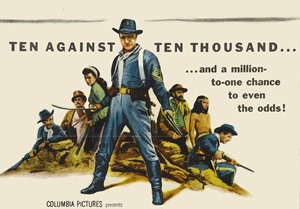
Directed by Andre de Toth • 1953
When the small town of Dry Buttes is burned to the ground by a group of Comanches, six Cavalry survivors retreat to their base at Fort Macklin with very little water, and even less of a chance of surviving the 100-mile stretch of desert. A remake of Zoltan Korda’s great 1943 WWII film Sahara, Last of the Comanches is a smaller, tenser film, which makes the underlying sense of desperation all the more effective, and its moments of kindness all the more humbling. Best known for his gruesome 3-D masterpiece House of Wax, Andre de Toth, a “Hungarian-born, one-eyed American cowboy from Texas” (his words) was responsible for some of the the bleakest and most unusual westerns in the genre (Ramrod, The Bounty Hunter, Day of the Outlaw). They’re also searingly beautiful—in particular Comanches’ use of sunlight, which is so bright you can feel your skin cracking. (It’s worth noting de Toth worked as second unit director on the equally blistering Lawrence of Arabia). With Lloyd Bridges, Barbara Hale, and sometime Schlitz Playhouse star Broderick Crawford. (JA)
85 min • Columbia Pictures • 35mm from Sony Pictures Repertory
Film Stock: Kodak 2383 (1999) Lab: Consolidated Film Industries
Cartoon: Sylvester and Tweety in “Tom Tom Tomcat” (Friz Freleng, 1953) – 16mm – 7 min
Wednesday, August 30 @ 7:30 PM / NEIU
GOLD DIGGERS OF 1935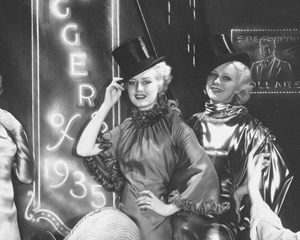
Directed by Busby Berkeley • 1935
Though he often received top billing on anything he touched, Gold Diggers of 1935 was the first feature directed entirely by Busby Berkeley, “Doctor Buzz, the Show Fixer.” The plot is a slight departure from previous backstage musicals, but similarly irrelevant: Dick Powell is a male escort for Gloria Stuart, Adolphe Menjou pulls his hair out trying to put on a show, and it’s all to support the Milk Fund. Then, out of nowhere, the most fantastic extended dance sequence you’ve ever seen: running nearly 15 minutes, “Lullaby of Broadway,” is widely regarded as Berkeley’s best set piece, both technically complex (in addition to the insane choreography, many effects were produced in camera) and breathtaking. Pre-Code purists need not fear, this one is still plenty sexy. A tragic and scandalous car accident shortly after the release of the film led to Berkeley being unofficially blacklisted, and he wouldn’t have this level of control over a film again until his The Gang’s All Here (1943). (JA)
95 min • Warner Bros. • 35mm from Chicago Film Society Collections, Permission Swank
Film Stock: AGFA
Cartoon: “Honeymoon Hotel” (Earl Duvall, 1934) – 16mm – 8 min
Special Thanks: Shayne Pepper, Michael Hines, Richard Helldobler, Kyle Burke, Cyndi Moran, Robert Ritsema, Jordan Kardasz, Ernie Kimlin, Steve Zivin, and Tony Adams of Northeastern Illinois University; Randy Andrews of Swank Motion Pictures; Brian Andreotti and Ryan Oestreich of the Music Box Theatre; David Antos & Chris Omiotek; Brian Belovarac and Ben Crossley-Marra of Janus Films; Andrea Benveniste of 20th Century Fox; James Bond of Full Aperture Systems; Antonella Bonfanti of Canyon Cinema; Dennis Chong, Paul Ginsburg, and Eric Chin of Universal; Joyce Chopra; Chris Chouinard of Park Circus; Evan Chung; Neil Cooper; Barbara Crandall and Caitlin Robertson of Fox Library Services; Justin Dean; Justin Dennis of Kinora; Amanda El-Khoury & Chaclyn Hunt; Bill Francik; Katherine Greenleaf; Cary Haber of Criterion Pictures, USA; Amy Heller and Dennis Doros of Milestone; Louis Irmo of First Nonprofit Insurance; David Jennings of Sony Pictures Repertory; James Layton of the Museum of Modern Art; Steven Lloyd; Steven Lucy; Julie McLean; Bob Morrissey; Kristie Nakamura of Warner Bros. Classics; Bruce Pavlow of Leisure Time Features; Mike Quintero; Julia Reinitz; Elena Rossi-Snook and Dave Callahan of the New York Public Library Reserve Film and Video Collection; Neal Sabin; Lynanne Schweighofer, Rob Stone, and Mike Mashon of the Library of Congress; Jon Shibata and Mona Nagai of Pacific Film Archive; Joe Swanberg; Quentin Tarantino; Kiyan Warner; Nancy Watrous, Brian Belak, and Amy Belotti of Chicago Film Archives; Todd Wiener of UCLA Film & Television Archive
And extra special thanks to our audience, who make it all possible!
